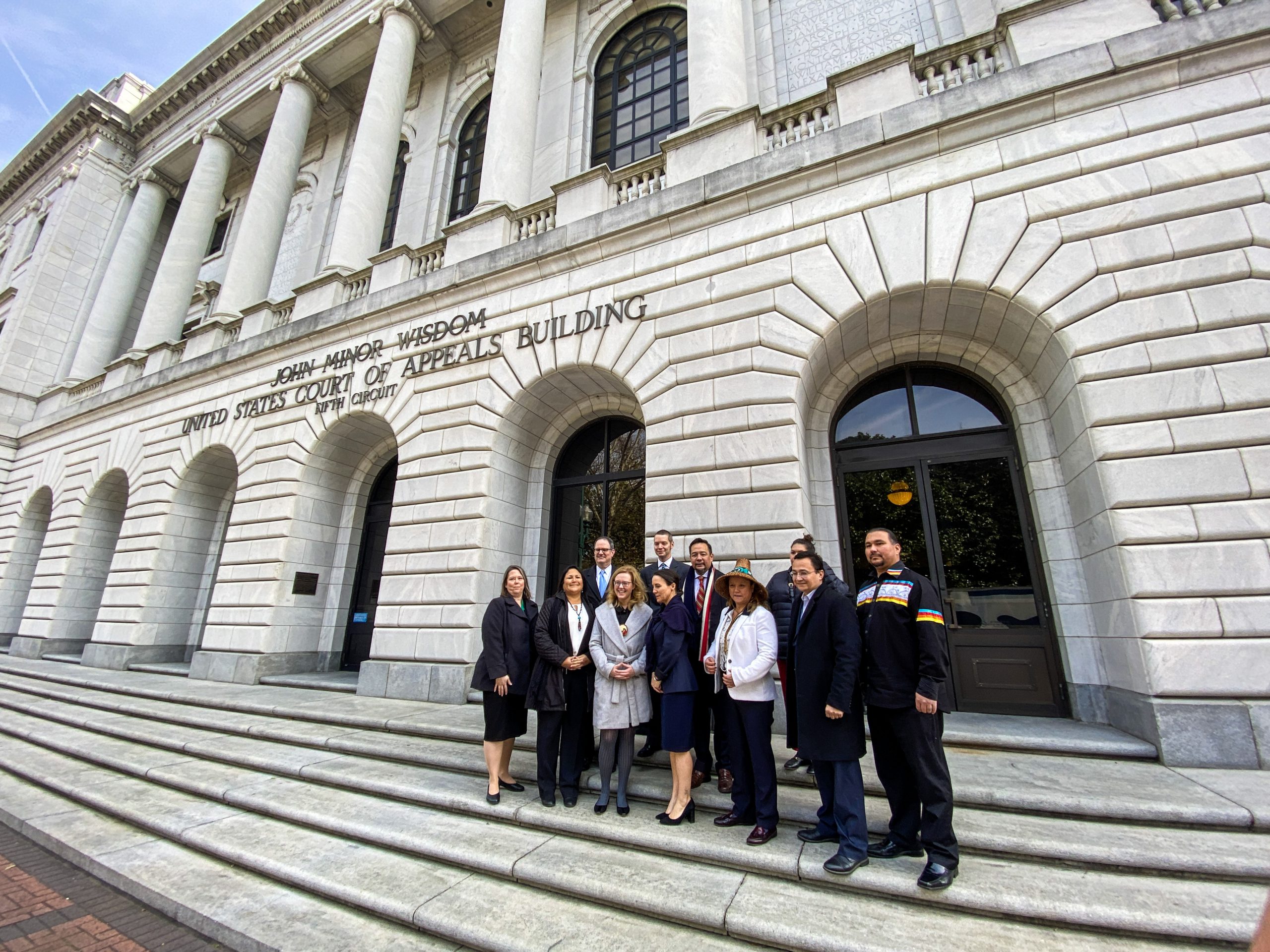
The complex ruling from 16 judges of the 5th Circuit court upholds a lower court’s finding that the Indian Child Welfare Act’s preferences for Native American families or licensed “Indian foster homes” violate constitutional equal protection requirements. It also said some of the provisions of the law “unconstitutionally commandeer” state officials’ duties in adoption matters. Attorneys for both sides were reviewing the 325-page document late Tuesday. The National Indian Child Welfare Association issued a statement as part of the Protect ICWA Campaign, a coalition of the National Indian Child Welfare Association, the National Congress of American Indians, the Association on American Indian Affairs, and the Native American Rights Fund. The association said while it’s pleased the court recognized that ICWA generally is within Congress’s authority, “we are deeply concerned that aspects of this opinion misunderstand the unique relationship between the United States and tribal nations.”A federal appeals court finally issued its long-awaited decision in a closely-watched Indian Child Welfare Act case.
— indianz.com (@indianz) April 7, 2021
So what's happening to #ICWA and #IndianChildren? Get some background on the #Brackeen case here.#DefendICWA #ProtectICWA #5thCircuit https://t.co/k0FEdXiPmq
The full implications of the decision on adoptive children in this and future cases were not immediately clear. Some of the key points were the result of 8-8 votes. The lack of a majority meant the lower court’s ruling prevailed on those points, but that no binding precedent was set by the appeals court. “It’s clear that the court could not quite make up its mind,” Nagle said. “And the question of whether or not the Indian Child Welfare Act is unconstitutional or constitutional, it does not merit a 325-page written decision. It’s actually not that complicated.” Nagle said the legal questions at issue in the lower court case, Chad Brackeen v. Ryan Zinke, “could and should be answered in a 10- or 20-page decision, not a grand 325 pages… things that are clearly within Congress’s constitutional authority when it comes to Indian affairs have been made incredibly messy and complicated.” The case could wind up at the U.S. Supreme Court. The makeup of the Supreme Court has changed with the addition of two justices appointed by former President Donald Trump. “We’re in a new era where, especially with the addition of Justice Neil M. Gorsuch, there is an opportunity for other justices, who maybe haven’t approached Indian law with the intellectual rigor that it deserves, to see Indian law in its true light. And I think that there is an opportunity here,” Nagle said. The 1978 law has long been championed by Native American leaders as a means of preserving Native American families and culture. In arguments last year, an Interior Department lawyer said Congress passed the law after finding that adoption standards at the state level were resulting in the breakup of American Indian families.National Indian organizations are "deeply concerned" about a federal appeals court ruling in a closely-watched Indian Child Welfare Act case.#ProtectICWA #DefendICWA #Brackeen #ICWA@NCAI1944 @NativeChildren @NDNrights @IndianAffairs https://t.co/yHg3e5LFeO
— indianz.com (@indianz) April 7, 2021
The resulting decision included multiple partial dissents and partially concurring opinions. On some issues, a majority of the court agreed. On others, the court tied, meaning the original district court decision on the issue prevailed, although the appeals court ruling on the issues won’t be considered precedential in future cases. The Associated Press contributed to this report.The 5th Cir. just dropped its long awaited en banc opinion Brackeen v. Haaland.
— Elizabeth Hidalgo Reese (Yunpovi) (@yunpovi) April 7, 2021
This is the Indian Child Welfare Act challenge where a district judge said the law was unconstitutionally discriminatory and a violation of the equal protection clause.#ICWAhttps://t.co/mCA3sFzNos
Brackeen v. Bernhardt Partial Dissent (August 16, 2019)
This article originally appeared on Indian Country Today LLC, a nonprofit, public media enterprise. ICT does not charge for subscriptions and tribal media (or any media, for that matter) can use the publication’s content for free. Contribute to the nonprofit Indian Country Today.
‘It takes our own people to help our own people’: Marchers honor lost Native children (November 27, 2020)
Photos: Memorial March to Honor Our Lost Children (November 27, 2020)
Crushing Colonialism: Colonizer theft of Indigenous children (November 17, 2020)
Indian Country Today: Fate of Indian Child Welfare Act up to federal courts (October 12, 2020)
Cronkite News: Native collective fosters creativity among youth
Arizona Mirror: Alert system in the works for missing endangered relatives
Native America Calling: Tribes challenge states on remaining roadblocks to gaming
New Mexico In Depth: ‘Turquoise Alert’ system established for missing relatives
Montana Free Press: Indigenous Peoples Day closer to reality in Montana
Cronkite News: Navajo Nation forced to accept transportation of uranium through reservation
Native America Calling: Is it the end of civil rights complaints in schools?
Cronkite News: President Trump targets Smithsonian in another anti-DEI effort
Native America Calling: Counteracting a pollinator crisis
Cronkite News: Arizona State University hosts annual powwow
Chickasaw Nation citizen T.W. Shannon joins Department of Agriculture
NAFOA: 5 Things You Need to Know this Week (April 14, 2025)
Bryan Warner: Cherokee Nation invests in food sovereignty
Native America Calling: Tribal libraries, museums, low-income heating and food sovereignty on the chopping block
More Headlines